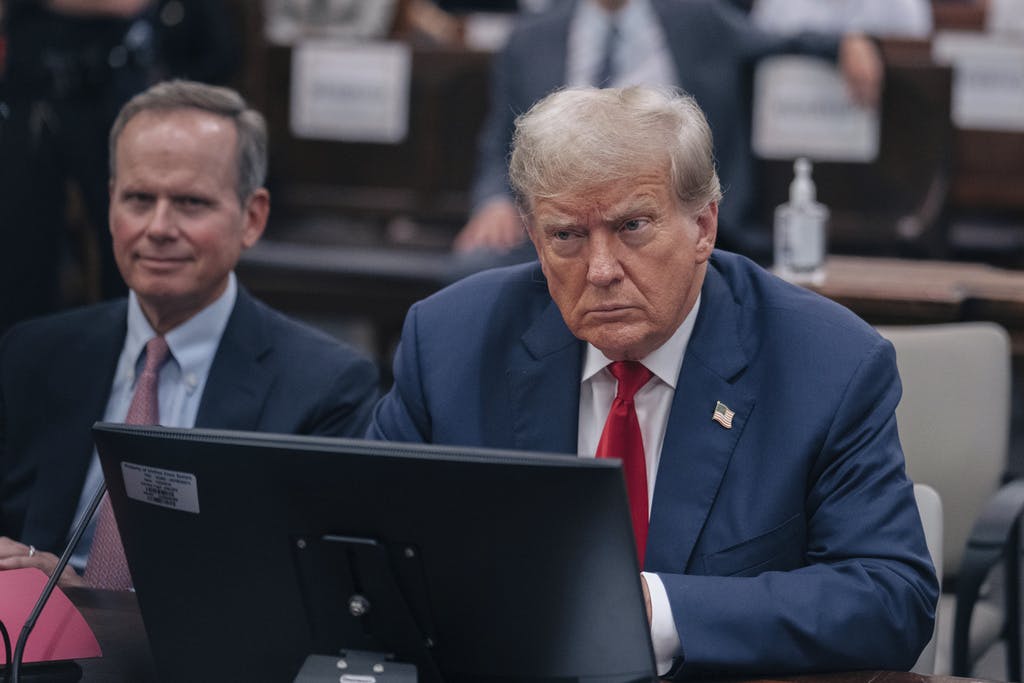Former GOP Officials Propose a New Constitutional Argument Against Trump’s Claim of Absolute Immunity
The officials accuse the former president of violating ‘our Constitution’ and aiming to ‘usurp the powers of the presidency.’

A novel constitutional argument proffered by a clutch of government officials who served across five Republican administrations could help put the party’s presidential front runner behind bars.
That possibility surfaced in an amicus curiae, or “friend of the court,” brief filed to Judge Tanya Chutkan, who is overseeing the January 6 case against Mr. Trump. The brief allows that its appearance is a “departure from this Court’s ordinary practice,” which does not allow such interventions.
The brief’s two dozen authors include Solicitor General Fried, Judge Michael Luttig — an advocate for using the Disqualification Clause of the 14th Amendment against Mr. Trump — Governor Whitman of New Jersey, and a handful of congressmen. They tout the “first brief ever to argue” that the Constitution’s Executive Vesting Clause provides grounds to reject Mr. Trump’s claim of absolute presidential immunity.
As the filing puts it, “four years, you lose, get out, the Presidency is vested in your successor.” The former officials maintain that “Our Constitution” does not support an “immunity so broad that it encourages losing first-term Presidents to employ criminal conduct knowingly and corruptly to attempt to usurp a second term.”
The Vesting Clause of the Constitution ordains that “The executive Power shall be vested in a President of the United States of America. He shall hold his Office during the Term of four Years, and, together with the Vice President, chosen for the same Term, be elected, as follows.”
The former officials tell Judge Chutkan that the plain sense of the passage “requires a first-term President who loses re-election to leave office.” They argue that Mr. Trump’s “post-election day efforts to overturn election results” are crosswise with that clause because they aimed to obstruct Mr. Biden’s vesting.
The brief maintains that Mr. Trump’s position that presidential immunity stretches beyond a president’s term would “encourage future first-term Presidents who lose re-election to attempt to violate the Executive Vesting Clause by knowingly usurping a second term” with impunity.
Seeking to cast the stakes beyond Mr. Trump, the amici reckon that “absolute immunity in this case would incentivize even knowing and corrupt illegal conduct by a first-term President to usurp another term,” rendering the Vesting Clause a dead letter. They add that their constitutional gloss does not speak to “ultimate factual innocence or guilt of the crimes charged” to Mr. Trump.
Citing their “interest in a strong Presidency” where “each elected President does not attempt to exercise executive power in a term for which he or she has not been elected,” the amici tout that they are breaking fresh constitutional ground in sussing out the relationship between the Vesting Clause and the defense of absolute immunity.
The amici worry that Mr. Trump’s expansive assertion of executive privilege — he wants the January 6 case against him dismissed on that basis — would enable presidents “who lost re-election to use criminal conduct to attempt to prevent the vesting of executive power,” in this case in the person of President Biden.
Dipping into constitutional history, the amici argue that the national parchment’s order that the president “shall hold his Office during the Term of four Years” requires a “first-term President who loses re-election to leave office at the end of his term.” This is constitutional bedrock — they argue that this clause “creates the Presidency and requires vesting the executive power in each elected President.”
The record of ratification discloses that, according to the amici, The Constitutional Convention” initially adopted provisions of a draft Constitution that would elect a President for a single seven-year term and make each President ineligible for re-election.” Ultimately, the decision was made to institute a four year term, with the possibility of reelection. The 22nd Amendment, limiting presidents to two terms, was ratified in 1951.
In the slim, 11-page argument, the former officials argue that a decision by Judge Chutlan to extend immunity retroactively to Mr. Trump — and proactively, to his successors — would vitiate the Vesting Clause in two ways. First, it would effectively extend a president term, unlawfully, beyond four years. Second, it would prevent the newly elected president from taking office.
The amici warn that a finding for Mr. Trump “would protect even a President who lost re-election, knew it, and deliberately used criminal conduct” to squat in office. This would, at the constitutional ground floor, “usurp the powers of the Presidency.” A president angling for a second term poses “unique” dangers to the Vesting Clause.
The brief argues that a similar danger is not posed during a first term, before election day, because a “president’s desire to win votes and avoid impeachment consequences provides much greater incentives to avoid an attempt to seize a second term.” The 22nd Amendment blocks a third term. It will be up to Judge Chutkan to make a decision that could affect which of the two men, President’s Biden and Trump, reach that constitutional maximum.

